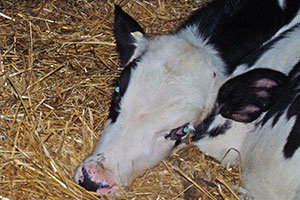Healthy Calf Conference
Follow to stay up-to-date on all Healthy Calf Conference updates. Speaker announcements, sponsorship information, registration announcements, and more.
Young calves have about five to 10 % more body fluid that adult animals. Calves are 75% water by body weight and can lose close to 20% body weight per day with diarrhea. To maintain normal cellular functions, the average water intake rate is 40-60 milliliters of fluid per kilogram of body weight daily. The average 100lb. calf requires approximately 4.5 litres of water daily.

Calves subjected to heat stress or scours will require an additional 20—30% daily of water intake for maintenance of body functions.
If you are not sure if the calf is dehydrated try the tenting test:
If the calf is dehydrated it will need to have a good oral electrolyte solution. A quality product should include:
Always mix electrolytes according to label directions to keep the correct ratio. Taking calves off milk is not recommended as they need the energy and protein that milk provides.
To determine the amount of electrolytes to feed, multiply the weight of the calf by the percent dehydration, and then divide by two to get the litres of liquid needed. For example, if a 100lb. calf is eight percent dehydrated (100 x0.08) you would divide eight by two that would equal four. That would be the amount of litres needed per day in addition to normal milk feeding to correct the dehydration. (100x.08)=8/2=4. During hot temperatures these amounts would be increased significantly. Healthy calves under heat stress will drink between six and 12 litres of water daily just to maintain hydration.
Calf Dehydration Assessment
| Mild dehydration | Moderate dehydration | Severe dehydration | |
| Hydration | <5% loss | 5-8% loss | 9+%loss |
| Stance | standing | weak | flat out |
| Skin tent | <3 seconds | 3-5 seconds | 6+ seconds |
| Membranes/gum condition | pink, moist | sticky/tacky, light pink | dry and pale, cold |
| Eyes | bright | slightly recessed | significant recession |
| Suckle reflex | strong | weak | none |
| Attitude | mild depression | dopey | maybe non responsive |
| Action | oral fluids | oral & intravenous fluids or sub Q saline | intravenous fluids (no oral fluids until able to suckle) |
Follow to stay up-to-date on all Healthy Calf Conference updates. Speaker announcements, sponsorship information, registration announcements, and more.
The Codes of Practice are nationally developed guidelines for the care and handling of farm animals. They serve as our national understanding of animal care requirements and recommended practices.